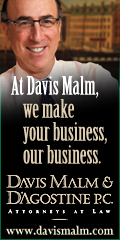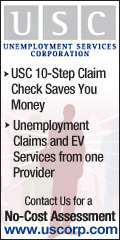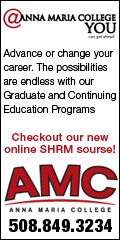NEHRA News
Northeast Human Resources Association
That’s why it is often troubling when a boss tells us, "You need to improve your communication skills." This can be particularly difficult for those of us who have moved up the ranks, in part because of our ability to relate to others. But not all communication skills are innate, and executives who are dominant in some areas may still need work in others. Effective communication skills can make or break a presentation, a project, a deal or even a career. With so much riding on communication, it makes sense to put more thought and effort into honing your skills.
Of course, many managers don’t know where to start and how to rectify their deficits. Workplace communication runs the gamut: composing important emails, writing a proposal, discussing issues, running a staff meeting, delivering difficult messages or maybe giving a speech in front of stockholders. The key point is to target specific communication skills for development. The first step is to do an assessment.
An assessment will help you pinpoint areas that need improvement. Perhaps you need to beef up your presentation abilities; or you may need to improve your one on-one or small group interactions; maybe you need to learn to deliver difficult messages well or maybe you need to work on your communication via technology, such as by email. For example, Blackberries have made it almost too easy to shoot off an email at the spur of the moment. Most managers could benefit from working on collecting and organizing their thoughts and removing some of the emotion before hitting the "send" button.
During the assessment, you should also get opinions from others. Ask a trusted colleague to give you constructive criticism about your communication abilities. For instance, if you need to improve your presentation skills, the colleague can help you target where to start: Do you need a stronger introduction? Are you able to effectively engage your audience? Are you dynamic? Are you defensive in addressing questions? Getting specific feedback will help you further strengthen your skills.
Once you have completed your assessment and know which skills need sharpening, you can then focus on improving your techniques. Here is a six-part framework to consider when developing a more effective communication strategy:
1. Who is the audience? Are you speaking to board members, colleagues at a staff meeting, new clients, a department, the entire organization or an external audience? Consider setting as well: there is a vast difference between a one-on-one meeting, a small group or a speech in front of thousands. Know your audience and what they are looking for. Communication is not one-size-fits-all, but should be customized for each specific group.
2. What is the goal? What are you trying to accomplish with this communication? Are you giving a report or trying to start a dialog? Are you answering questions or asking them? Are you brainstorming ideas or trying to solve a business issue? Think about what you need as an end result as a way to frame the communication.
3. What are the messages? You may want to relay one main message or several. It is important to be succinct and to have a deep understanding of your messages so you can get your point across successfully. If you aren’t able to clearly articulate your messages to another person—without stumbling—you need to develop them further.
4. What is the content? The content is the actual information you will include in the communication. How will you structure the information? What is the best format? What is the sequence? What technologies will you need and do you have a mastery of them?
5. Where can I get feedback? Reach out to others for feedback. Where does your communication style need strengthening? Are the messages clear? Does information need to be added, removed or more clearly explained? Many of us develop "tunnel vision" when crafting a speech, proposal or presentation, and a fresh set of eyes can lend depth and perspective to the project.
6. How can I refine it? Use the information gathered from your feedback sources to polish your communication. This is a tricky step in the process. You want to spend enough time fine-tuning your work, but not so much time that you overwork—and possibly weaken—it.
Effective communication is vital to being a successful leader. Yet, most of us have at least one area of communication where we could use improvement. If you identify that area and follow this framework for honing your skills, you can turn yourself into a better manager by becoming a more effective communicator. Improving communication skills can help build more effective teams, organizations and careers.
About the Author:
Mike is a Managing Partner at Camden and oversees all of the firm's strategic business development activities and client engagements. Under his leadership, Camden has established a reputation as a thought partner in the growing talent management arena. He splits his time running Camden while providing leadership development coaching and consulting to senior executives.
Mike has extensive executive management and senior-level consulting experience. Before joining Camden, he held diverse senior line management roles with FleetBoston Financial. His practical, hands-on line management experience is exemplified in his consulting work with executives and senior leadership teams.
Mike holds a Bachelor's degree from Harvard College and completed extensive coursework at Harvard Business School. He completed executive training at the Center for Creative Leadership and he is certified in the Center's developmental assessment instruments. Mike served on the Board of Directors of the Bankers Association of Foreign Trade, the Rhode Island Public Education Fund, Special Olympics Rhode Island and the Rhode Island Zoological Society.
Outside of Camden, Mike enjoys an occasional round of golf, traveling with his family and is involved in work with several community and non-profit organizations.
Nothing compares to coaching when it comes to helping people perform at their best and accelerate their careers. Not re-engineering, not team building, not quality programs. Coaching works because it is focused on the individual rather than on the organization and its processes. Even mediocre coaching can produce remarkable results. Individuals become energized (or re-energized) about their work, take full ownership of their performance and their careers, find and rejuvenate long-lost talents and make major shifts in their contribution levels. You can easily see this for yourself. Go and speak to anyone in your organization who has significantly increased their performance and I will guarantee that you will find a coach involved somewhere. He or she is always there.
What would happen if everyone in your organization had a personal coach?
The results would be astounding. However, coaching is an expensive, time-intensive process and it is impractical to provide every organization member with an external coach. Many progressive organizations are making great strides in equipping their managers to be skilled coaches through programs like Bluepoint's Leader as Coach Workshop. The problem is that today's organizations are extremely frenetic and managers face near limitless demands on their time. Even the most well-meaning and committed managers have enough time to coach only a portion of their team members.
Why can't everyone be a coach?
They can. Coaching is not the exclusive domain of senior leaders and external professional coaches. Everyone can coach. Every person in the organization can sit with another person and challenge them to lift their game, encourage them to see new possibilities, confront them with their own potential, affirm their many talents and remind them of how great it feels to do extraordinary work. The problem is that most leaders still see coaching as advising others, providing feedback, teaching skills and solving problems. These are all good managerial practices but they do not constitute coaching. When well-coached, people will solve their own problems, seize their own opportunities and chart their own futures.
How does this work?
The process is surprisingly straightforward but does not come without investment on your part. You need to be personally involved every step of the way. Here are the seven things you need to do:
1. Strongly encourage everyone in the organization to invite another organization member to coach them. Anyone can coach anyone else. (Yes, I appreciate that some will not get invited and their feelings will be hurt. These people should thank you. Since we really need to earn the right to coach others, this is very valuable feedback, even if a bit painful.)
2. Dive into the process yourself. Invite someone in the organization to coach you, and insist that all senior leaders do the same. (You will undoubtedly notice that "insist" is a bit stronger than "encourage.")
3. Anyone can coach anyone. A good coach is a good coach. Don't waste HR's time in the futile pursuit of "good matches" or "chemistry." (And yes, you can coach your boss.)
4. Ask people to take on only one coaching assignment at a time. This will ensure that each person will receive the full attention of their coach and will spread the coaching opportunities (and load) throughout the organization. (Please note that nothing in this program absolves leaders from being consistently coach-like with all of their team members.)
5. Provide the following loose but important guidelines: Coaching pairs should meet in person or via telephone for 30-60 minutes (this is lots of time for great coaching to happen) every 2 to 3 weeks (this will keep the momentum going) for 4 to 6 months. (This is enough time to develop new performance standards and create new habits.)
6. At the end of every coaching engagement, encourage people to invite a different organization member to coach them. (Yes, there is always another, higher level of performance possible and a good coach will not rest until it is found.)
7. Equip everyone in your organization with the skills and approaches necessary to immediately coach at a high level. If you find the right program, this will only take one day, two at the most. Unfortunately, most coach training programs focus an inordinate amount of attention on interpersonal skills such as active listening and providing feedback.
While these are important, it is even more important that your people participate in a highly experiential training program that introduces them to the potency of coaching, provides them opportunities to practice real coaching and receive direct feedback on the same. You will also want to make sure that they are fully equipped with the tools necessary to:
- ask questions that pierce through closely held assumptions and mental models,
- onstructively confront unhelpful behaviors, practices and attitudes,
- affirm strengths, talents and abilities even if rarely employed and
- share fresh perspectives no matter how radical.
Every major survey of employee engagement tells us the same thing: most of our people, even our top performers, are leaving their best at the door each morning. They are simply not bringing their very best talents and energy to their work. Help them do this. Give them a coach. Stand back and watch. Coaching is everyone's business...and can change the entire game!
About the Author:
Gregg Thompson is a facilitator, coach, author and speaker with a passion for developing the greatness in individuals and organizations. As president of Bluepoint Leadership Development (www.bluepointleadership.com), he leads a talented group of worldwide professionals who design and deliver challenging educational experiences that accelerate the natural development of leaders.
This award is presented annually to 20 Massachusetts "lawyers who have been members of the bar for ten years or less, but who have already distinguished themselves in some way and appear poised for even greater accomplishments."
Congratulations Allyson!
It will also ensure that your information is correct in the Member Directory. Once you log in, go to the "About NEHRA" tab and select Membership Directory and then click on Update my Membership Profile.
While you are updating your profile, you might want to consider joining one of the Community Forums or adding your name to one of the Listservs. An updated profile and connecting to one of the NEHRA Communities is a great way to maximize your membership and create your personal network.
If you need help with this process please do not hesitate to contact Carole Edson, Director of Membership, at cedson@nehra.com.
- To become a fan of NEHRA on Facebook, CLICK HERE.
- If you are already a member of LinkedIn, CLICK HERE to join the NEHRA LinkedIn Community!
If you are not already a member of LinkedIn, you will need to follow the easy steps to create your profile. Once your profile is completed you can follow the steps below to become a member of the Northeast Human Resources Group.
- Find the tab for "Groups" on your home page and select "Group Directory."
- Use the search function in the upper right and type in "Northeast Human Resources Association."
- Click on "Join this Group."
- This will bring you to a description of the group and you will be asked to make selections about your preferences for display the group logo on your personal page.
- Enter a contact email address, a digest e-mail address, delivery frequency, announcements and messages.
- Once you have made these choices click the button "Join Group."
- Your message will come to the NEHRA Group Administrator to verify membership and approve you for the group.
To Join a Community Forum Subgroup on LinkedIn
- Once you are a member of the Northeast Human Resources Group, select "Subgroups."
- Select all the groups you are interested in joining.
- Your request goes to the NEHRA Group Administrator for approval.
- You will receive a message that you are a member of this subgroup and you can begin to read and post information on the Subgroup page.
Current NEHRA Subgroups
- Learning and Development Community Forum
- Diversity and Inclusion Community Forum
- Consultants Community Forum
- Small Business HR Community Forum
- HR Technology Community Forum
- Talent Acquisition Community Forum
- Flexible Workplaces Community Forum
For more information or to sign up for this opportunity, contact the NEHRA office today at (781) 235-2900 or via email at info@nehra.com.
The companies or Employment Partners benefit by outsourcing a full-time, entry-level, professional job to one team of four students who share the job. The NDHS student workers are an innovative resource that enables organizations to increase their diversity and to make a real impact on the workforce of the future without adding to their roster of full-time employees. Many Employment Partners really value the energy that the student workers bring to their companies.
As NDHS continues to grow, the CWSP seeks additional Employment Partners for our students. To learn more about the CWSP and how it can benefit your company, please go to www.ndhslaw.org/corporate-work-study-program.



